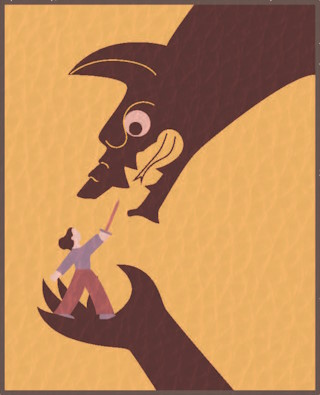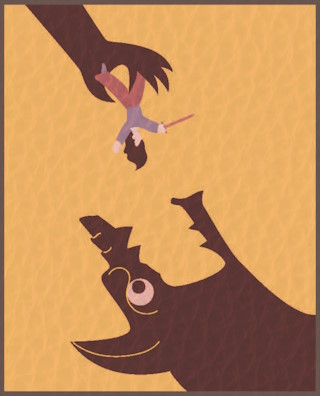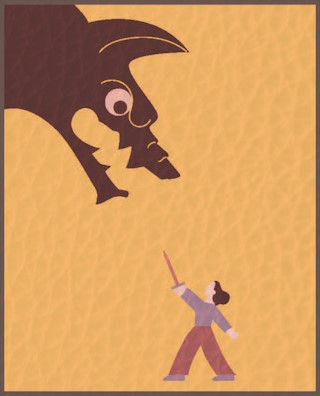Conquering the Three Mental Enemies of Adults with ADHD
You had the best of intentions. You were going to finish that project. You thought about it every day. You planned it in detail. But somehow it didn’t happen.
You promised your child you’d be the first car in line at school pickup today. And that didn’t happen either. Where does the time go?
You can feel it now, before they even know you messed up. Your partner is disappointed, frustrated, or angry. Your boss is annoyed. Your child is upset. You feel like a failure, or worse: a burden.
This can be the most painful part of living with adult ADHD. You find yourself repeatedly feeling like you’ve let down the people who matter most to you. You may expect their frustration or disappointment even if it isn’t coming. And because of rejection sensitivity, you may feel it more intensely.
Not all people with ADHD experience this, but many do. Rejection sensitivity is an intense or overwhelming emotional pain you feel when someone rejects you (expresses or seems to have a negative opinion of you). It’s possible to experience rejection sensitivity when you expect someone will be unhappy with you, even if they actually aren’t.
How you think about yourself matters. And in the scenarios above, it can make the difference between living well with ADHD and spiraling into depression.
The three mental enemies
There are three specific thought patterns that work together to keep you discouraged. Adults with ADHD are highly susceptible to developing these patterns. They’re the same patterns that made you think you were lazy, crazy, or stupid as a child. We’ll call them your “mental enemies.” Fortunately, these mental enemies can be defeated. Here are the steps for winning the battle against them.
Step 1: Know what the enemies sound like in your head.
Step 2: Recognize them when they pop up.
Step 3: Use your secret weapon to defeat them.
Let’s get to know the enemies, so we’re ready to defeat them.
ENEMY #1: Negativity Bias
 What is it? Negativity bias is the basic human tendency to focus more extensively on the bad than on the good. Negativity bias makes us hyperaware of problems and less aware of solutions or things that are going well.
What is it? Negativity bias is the basic human tendency to focus more extensively on the bad than on the good. Negativity bias makes us hyperaware of problems and less aware of solutions or things that are going well.
What it sounds like: You find yourself making more “I should” or “I need to” statements than “I have,” “I did,” or “I can” statements. Also, you find that your “I am…” statements more often end with a negative adjective (clumsy, stupid, lazy, irresponsible, scatterbrained) than a positive one (ready, capable, excited, aware, resilient).
Why it’s hard for adults with ADHD. When we focus, we really focus. Rather than quickly dismissing the positive, we’re likely not to notice the positive at all.
Your secret weapon: An extra dose of positivity. You can’t make negativity bias go away. But you can counteract its negative effect on your mood and self-esteem. Do this by building a positivity habit into your routine.
- Set a phone alarm that pops up “three positives” on your screen throughout the day. When you see it, make three positive statements about what’s happening in that moment or since the last alarm.
- Write an affirmation on your mirror every day. Read it out loud before brushing your teeth, morning and night. (It’s okay if it feels silly.)
- Make a family plan to pay compliments to each other at dinner every night.
- Keep a gratitude journal.
Whatever new habit you’re trying to build, be sure to set phone alarms or program a smart speaker to remind you!
ENEMY #2: Cognitive Distortion/Catastrophizing
 What is it? Cognitive distortion is faulty or inaccurate thinking, perception, or belief. We often experience it as “all or nothing” or “black and white” thinking. Catastrophizing is a type of cognitive distortion that involves exaggerating the negative consequences of events or decisions. In other words, expecting that the worst will happen.
What is it? Cognitive distortion is faulty or inaccurate thinking, perception, or belief. We often experience it as “all or nothing” or “black and white” thinking. Catastrophizing is a type of cognitive distortion that involves exaggerating the negative consequences of events or decisions. In other words, expecting that the worst will happen.
What it sounds like: You think or believe:
- I always let them down.
- I never get it right.
- I’m totally irresponsible.
- They hate me. (catastrophizing)
- If this doesn’t go well, my career is over. (catastrophizing)
- She’ll never trust me again. (catastrophizing)
Why it’s hard for adults with ADHD: Catastrophizing is a common feature of anxiety and depression, both of which are more common in adults with ADHD. Catastrophizing can also contribute to rejection sensitivity.
Your secret weapon: Balanced thinking (Just the facts, ma’am.) Practice balanced or both/and thinking. This means replacing language like “always” and “never” with more specific, more accurate statements. These specific statements honor the reality of the situation (“I made a mistake” or “This really is a big deal”) and let go of assumptions or judgements about yourself and others. Try saying these out loud, and see which feels better: the original statement, or the new.
| Distorted Statement | Balanced Statement |
| I always let them down. | They might be disappointed about how this went. |
| I never get it right. | This is hard for me to do (possibly because of my ADHD). |
| I’m totally irresponsible. | I dropped the ball on this one. |
| They hate me. | They might not like what I did, or they might be okay with it. or They might want to be my friends, and they might not. |
| If this doesn’t go well, my career is over. | This project may have a big impact on my career. |
| She’ll never trust me again. | I may have to rebuild some trust after this. |
ENEMY #3: Perseveration
 What is it? Perseveration is persistence in doing something to an exceptional level or beyond an appropriate point. That doesn’t sound so bad! In fact, we can sometimes use it to create something extraordinary. But this is the one that keeps the other two enemies active in your head over time.
What is it? Perseveration is persistence in doing something to an exceptional level or beyond an appropriate point. That doesn’t sound so bad! In fact, we can sometimes use it to create something extraordinary. But this is the one that keeps the other two enemies active in your head over time.
Why it’s hard for adults with ADHD: It sounds a lot like ADHD hyperfocus. And that means that adults with ADHD are especially good at it. It becomes a problem when we perseverate on negative messages about ourselves. When we repeat “I screwed it up again” or “why am I such an idiot?” over and over again, the impact intensifies. And it can stop us from moving on or fixing what went wrong.
In fact, the definition of perseveration also includes “an inability to interrupt a task or to shift from one strategy or procedure to another.” That sure sounds like our ADHD brains! We can easily get stuck in a loop of self-criticism. Use your secret weapon to get out.
What it sounds like: Reviewing an event over and over in your mind, especially one that didn’t go well. Repeating the same fears or “what if” statements, without examining whether they are realistic or seeking solutions.
Your secret weapon: Growth mindset (action!). A growth mindset requires starting with a balanced statement of the problem, and following it up with an action step. The balanced statement helps shut down perseveration, because it isn’t as emotionally charged as the distorted statements above. Planning your next step (and acting on it if possible) helps you move on from what went wrong.
| Balanced Statement of the Problem | Next Step (Growth Mindset) |
| They might be disappointed about how this went. | We can talk it through (or try again tomorrow). |
| This is hard for me (possibly because of my ADHD). | I’m going to look for a different way to do it, one that works better for my brain. |
| I dropped the ball on this one. | I do better when I set reminders for myself. I’ll set the reminder for next time right now. |
| They might not like what I did, or they might be ok with it. or They might want to be my friends, and they might not. |
I’ll ask for their feedback, and work on things that I can change. or There will be other people I’m more compatible with. It’s time to find them. |
| This project may have a big impact on my career. | I’m going to give it my best effort. |
| I may have to rebuild some trust after this. | I can talk with her to find out what she needs from me. |
Practice makes progress, and therapy helps
As you’re learning to use your secret weapons, be careful not to expect perfection from yourself. When you catch yourself struggling, you’re halfway there. Practice using it all together.
You’re doing your best to use balanced thinking and a growth mindset. It’s going okay sometimes, but it’s easy to forget. You think to yourself “I’m terrible at this! I’ll never get it.” Now, turn that into a more balanced statement. Try it before reading the options below.
You might have said, “The enemies got me this time.” Or “I caught myself catastrophizing. Oops!” Or “Wow, this is harder than I thought.” Remember, your balanced statement honors the truth of the situation (“I didn’t use my secret weapons this time, even though I planned to.”). Add the growth mindset with “I’ll definitely have another chance to practice.” Voila! What felt like a mistake is now a success.
How therapy for ADHD can help
Most talk therapy approaches are based on cognitive behavioral therapy, and at the core of CBT is teaching balanced thinking. A therapist experienced in ADHD can help you work through the particular blocks that come up for you when you try this skill. And debunk the negative messages you repeat to yourself.
A therapist who treats ADHD in particular should also focus on helping you create an ADHD-friendly lifestyle. This means setting up tools and strategies that work well for your ADHD brain. An ADHD-friendly lifestyle helps you experience success more often. And struggle less with your three mental enemies.
Finding the right therapist
After years of feeling judged, dismissed, or shamed by professionals, it can be hard to trust a therapist. Be sure to look for a therapist who specializes in working with ADHD and neurodivergent individuals in particular. A great therapist will help you turn this shame, frustration or overwhelm into a unique strategy that works for your brain. CHADD’s Professional Directory is a good place to start.
Most therapists offer a free fifteen-minute phone consultation to answer your questions about their approach. If the fit doesn’t feel quite right on the phone, try someone else. There are many excellent therapists out there, and you deserve to work with the one that’s right for you.
TAKEAWAYS
The “Quick Read”
Everyone makes mistakes. With ADHD in the mix, we tend to have more “oops moments” than we’d like. The way we think about them afterward can either improve or degrade our mental health. To recover from mistakes in a mentally healthy way, try these strategies:
- Intentionally look at the positive in your life several times per day. Make a habit of it by setting alarms/reminders for yourself until it’s automatic.
- Make realistic (purely factual) assessments of what has gone/could go wrong. Watch out for a tendency to assume/predict how someone else will react. Avoid using words like always, never, completely, or definitely.
- Move on quickly by planning what to do to make it better, and taking immediate action on the plan. If your mistake affected someone else, do ask the people involved what they need to see happen. (Don’t assume you already know.)
- Practice without expecting perfection.
- Consider consulting an ADHD therapist to help you build an ADHD-friendly lifestyle. You’ll find yourself less frustrated, and get some good practice using the skills above

 Robin Brannan, a licensed clinical marriage and family therapist, is the director of Better Together Family Therapy in Kensington, Maryland (https://betterfamilytherapy.com). For over twenty years she has specialized in helping families with ADHD thrive across the lifespan. Her team treats ADHD and anxiety through a neurodivergence-friendly and LGBTQIA+ affirming lens.
Robin Brannan, a licensed clinical marriage and family therapist, is the director of Better Together Family Therapy in Kensington, Maryland (https://betterfamilytherapy.com). For over twenty years she has specialized in helping families with ADHD thrive across the lifespan. Her team treats ADHD and anxiety through a neurodivergence-friendly and LGBTQIA+ affirming lens.
MORE INFORMATION
CHADD’s Professional Directory | https://chadd.org/professional-directory/
Vaish A, Grossmann T, & Woodward A. (2008). Not all emotions are created equal: The negativity bias in social-emotional development. Psychological Bulletin, 134(3), 383–403. https://doi.org/10.1037/0033-2909.134.3.383
Hargitai LD, Livingston LA, Waldren LH, et al. Attention-deficit hyperactivity disorder traits are a more important predictor of internalising problems than autistic traits. Scientific Reports 13, 31 (2023). https://doi.org/10.1038/s41598-022-26350-4


